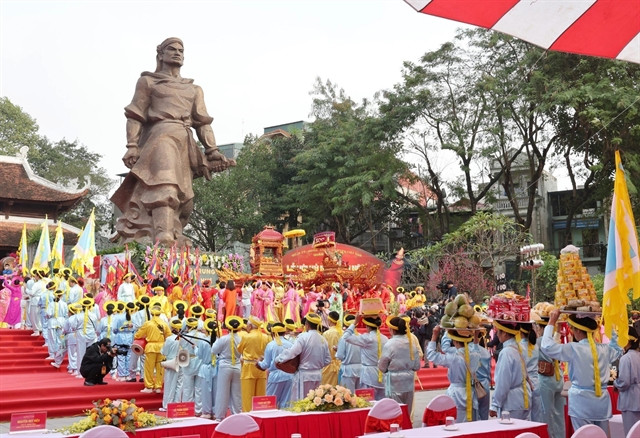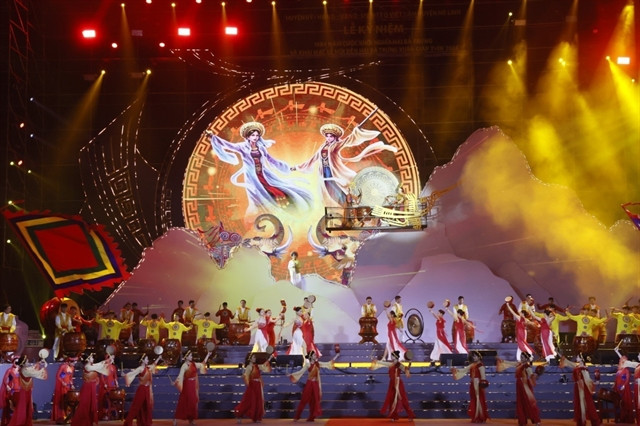 |
| Đống Đa Festival is held on the 5th day of the first lunar month to commemorate Emperor Quang Trung’s victory over Chinese Qing invaders over two centuries ago. VNA/VNS Photo Minh Quyết |
The SoC, issued on August 3, 2023, aims to encourage and guide localities and festival organisers throughout the country to enhance the quality of traditional festival management, creating a healthy cultural environment that meets the cultural and spiritual needs of the people, Ninh Thị Thu Hương, director of the Cultural Heritage Department under the Ministry of Culture, Sports, and Tourism, said.
It also helps preserve and promote national traditional cultural values, popularise good customs and practices in society and gradually eliminate negative and backward traditions, raising local people’s and tourists' awareness and responsibility about building a "healthy cultural environment '' when participating in festive events.
According to the director, festival management has seen significant improvements this year. Provinces and cities have taken proactive measures by developing comprehensive plans for overall festival operations, providing direct guidance in developing scripts, plans and feasible scenarios for festivals.
The scale and duration of traditional festivals have expanded this year. In Hà Nội, the Đống Đa Festival was organised for the first time and lasted for three days from February 14-16, or the Hai Bà Trưng Temple Festival in Mê Linh District has also been held at the largest scale ever.
Previously, the culture ministry issued several documents requiring localities to enhance measures to ensure the safe, healthy and civilised organisation of festivals.
At the same time, the ministry has also issued documents requesting close monitoring of festivities in localities that attract large numbers of visitors, such as Hà Nội, Hải Phòng, Nam Định, Phú Thọ, and Vĩnh Phúc.
Digitalisation of festival data
 |
| The Hai Bà Trưng Temple Festival in Mê Linh District has been held at the largest scale ever. VNA/VNS Photo Văn Điệp |
The Cultural Heritage Department is also implementing the digitalisation plan for festival data in Việt Nam for the 2021-2025 period.
According to statistics, there are currently 8,868 festivals nationwide, of which 8,103 are traditional festivals.
This initiative aims to manage and standardise the archival practices and fill the gaps in documentation for certain festivals, which have posed challenges to management work in recent times.
Together with the implementation of the SoC, the plan will contribute to enhancing the effectiveness of management and organisation of festivals in the future.
The digitisation, standardisation and establishment of a festival database will be implemented in two phases: Digitisation and database construction for traditional festivals after investigation and survey; and Digitisation and database construction for cultural festivals, industry-specific festivals, and festivals originating from foreign countries.
Alongside this, a portal will be developed and operated to store, manage, exploit and report on data obtained from digitalisation and statistical surveys. It will ensure convenient access, meeting the state's management needs regarding festivals, serving the information retrieval and utilisation of internet users, as well as promoting the cultural value of Vietnamese festivals.
According to the Cultural Heritage Department, localities have been conducting surveys, updating and sending information to contribute to the Vietnam Festival Information Portal since the launch of the plan.
The department has completed the development of the Vietnam Festival Information Portal, lehoi.com.vn, which consists of thousands of pages of documents, articles, images and videos introducing various types of festivals in Việt Nam.
The materials are compiled and grouped according to the following categories: traditional festivals, cultural festivals, occupational festivals, and festivals originating from foreign countries.
"The digitisation of festivals will effectively serve the work of document retrieval and introduction of the traditional cultural values of ethnic groups in Việt Nam, creating a significant transformation in the management and organisation of festivals.
“The materials are edited, modified and digitised in various forms, enabling quick and efficient retrieval of information and promotion of festivals," said Director Hương. VNS